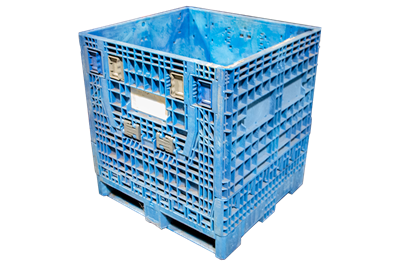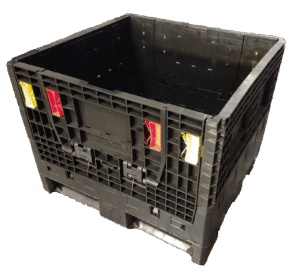How used plastic containers help businesses reduce waste effectively
Wiki Article
The Ultimate Overview to Picking the Right Bulk Containers for Your Company Demands
Picking the proper bulk containers is essential for any business that relies upon efficient logistics. Various sorts of containers exist, each made for details materials and applications. Elements such as size, material compatibility, and governing requirements play a considerable function in this decision-making procedure. Comprehending these elements can bring about boosted operational efficiency. Many businesses overlook vital aspects that might enhance their general efficiency and sustainability. What are these considerations?Comprehending Different Kinds Of Mass Containers
Bulk containers work as crucial devices for companies seeking efficient storage space and transportation services. These containers are available in different kinds, each developed to satisfy particular functional requirements. One usual kind is the intermediate mass container (IBC), which is suitable for liquid and granulated materials, providing an equilibrium of ability and ability to move. One more preferred alternative is the mass bag, or FIBC, suitable for dry, flowable items. These versatile containers are lightweight and can be conveniently moved and stored. For larger products, stiff mass containers are often utilized, supplying resilience and stability for safe handling. Additionally, there are specialized containers tailored for unsafe materials, guaranteeing conformity with safety regulations. Understanding the unique features of these bulk container kinds permits organizations to make informed decisions that enhance logistics and reduce expenses. By selecting the best container, business can boost their operational effectiveness and enhance their supply chain processes.Secret Material Considerations for Bulk Containers
When choosing bulk containers, it is important to ponder the products utilized in their building. Elements such as chemical, resilience, and stamina compatibility play a crucial function in making certain the containers fulfill certain operational demands. Furthermore, weight and mobility worries can influence both efficiency and transport logistics.Material Durability and Toughness
Longevity and toughness are crucial factors in selecting materials for bulk containers, as they directly affect the container's capability to endure different ecological problems and dealing with procedures. Materials such as high-density polyethylene (HDPE), polypropylene, and stainless steel are typically preferred for their robust residential or commercial properties, using resistance to influence, abrasion, and temperature variations. The option of product additionally affects the general life-span of the container; stronger products typically result in much less regular substitutes, leading to set you back financial savings over time. In addition, the weight of the product can influence delivery prices and ease of handling. Organizations have to consider their certain operational atmospheres and the potential for damage to ensure peak toughness and toughness in their mass container option.Chemical Compatibility Factors
Understanding chemical compatibility is necessary for choosing mass containers, as the products used need to resist the particular materials they will hold. Various aspects affect compatibility, including the chemical nature of the contents, temperature level, and period of storage. As an example, destructive chemicals may need containers made from stainless-steel or specialized plastics that withstand destruction. Additionally, responsive materials can produce heat or gases, demanding vented or pressure-rated containers. The selection of container product, whether polycarbonate, polyethylene, or steel, need to straighten with the chemical homes of the stored materials to stop breaches or leakages. Eventually, a comprehensive analysis of these compatibility factors ensures safe handling and storage, protecting both personnel and the environment while keeping item integrity.Weight and Transportability Problems
Choosing bulk containers includes not just reviewing chemical compatibility but also taking into consideration weight and transportability. Businesses need to evaluate the ease of handling and transportation to optimize performance. Light-weight materials like high-density polyethylene (HDPE) or light weight aluminum can facilitate less complicated movement and reduce delivery costs. On the other hand, larger containers may offer boosted sturdiness but can prevent wheelchair, especially in atmospheres requiring frequent moving. Additionally, the style of the container must allow for hassle-free lifting and piling, making certain ergonomic safety for employees. Companies ought to likewise think about the framework offered for transport; for instance, containers compatible with forklifts or pallet jacks can streamline operations. Ultimately, the ideal balance in between weight and mobility directly affects functional efficiency and price effectiveness.Sizing Your Mass Containers for Optimal Efficiency
When sizing mass containers, companies must meticulously analyze the dimensions required to fit their details items. Furthermore, weight capacity is an essential factor that influences efficiency and safety throughout transportation and storage. Efficient sizing not only maximizes room however additionally maximizes functional operations.Identifying Container Dimensions
Picking the best measurements for mass containers is vital for taking full advantage of effectiveness in storage and transportation. Organizations have to examine their details demands, taking into consideration aspects such as readily available space, the nature of the items being kept, and the techniques of transportation used. Accurate dimensions guarantee that containers fit preferably in stockrooms and vehicles, minimizing wasted space and minimizing managing time. Requirement dimensions can use comfort, yet customized dimensions may be required for one-of-a-kind needs or to accommodate certain products. Furthermore, it is essential to assess piling capabilities and accessibility, as these variables influence overall operational efficiency. Eventually, the best measurements cause enhanced company and structured logistics, profiting the general efficiency of the service.Weight Ability Considerations
Understanding weight capacity is crucial for businesses aiming to maximize their bulk container performance. The weight capacity of a container straight affects storage space abilities, transportation logistics, and total functional expenses. Picking containers with the ideal weight restrictions assures that businesses can safely keep and transport their goods without risking damage or conformity concerns. Straining containers can result in structural failings, while underutilizing ability outcomes in thrown away resources. When choosing containers, it is essential for organizations to examine their product weights and consider any kind of regulative demands. In addition, variables such as the kind of product, planned use, and environmental problems need to additionally affect weight capability decisions. By examining these aspects, services can enhance effectiveness and guarantee a structured supply chain.Governing Compliance and Safety And Security Specifications

Regulatory conformity and safety requirements play a vital duty in the selection of mass containers for companies. Organizations must assure that their containers meet different laws established by local, nationwide, and worldwide authorities. These requirements usually concern product security, structural honesty, and correct labeling, which help avoid crashes and assure the secure transportation of items.
In addition, adherence to industry-specific standards, such as those from the Fda (FDA) or the Occupational Safety And Security and Health Management (OSHA), is crucial for business managing dangerous materials or foodstuff. Non-compliance can result in penalties, legal problems, or damages to a service's online reputation.
Services need to additionally take into consideration the container's compatibility with the products being kept or transported to stay clear of contamination or chemical responses (used plastic containers). To sum up, understanding and executing regulatory conformity and safety and security criteria is important for the responsible and reliable use mass containers
Sustainability Options for Eco-Friendly Bulk Containers

Firms are additionally exploring alternatives made from recycled materials, which not just preserve resources yet likewise support the recycling sector. Technologies in layout permit for lighter containers that call for less energy to transportation, better boosting sustainability. By incorporating these environmentally friendly bulk container choices, services can demonstrate their dedication to ecological stewardship while fulfilling consumer demand for sustainable practices. This shift not just aids the planet but can additionally improve brand reputation and client loyalty.
Cost-Effectiveness and Budgeting for Bulk Containers
While lots of services focus on sustainability, cost-effectiveness continues to be a critical factor when picking mass containers. Organizations should evaluate the preliminary purchase cost, in addition to long-lasting operational prices, to assure economic viability. Aspects such as reusability, maintenance, and longevity play a significant role in identifying total expenses.Buying top notch containers may generate greater ahead of time prices however can lead to cost savings through decreased replacement rates and reduced waste. Furthermore, organizations need to consider transport costs and storage performance, as these can impact the general budget.

Regularly Asked Inquiries
How Do I Identify the Right Container for Hazardous Products?
To determine the appropriate container for harmful materials, one must review compatibility with the substance, think website about the container's material, look for regulatory compliance, and assess capability and security attributes to guarantee appropriate handling and storage space.Can Bulk Containers Be Customized for Particular Products?
Yes, bulk containers can be customized for details products. used collapsible bulk containers. Numerous attributes, such as layout, material, and size, can be customized to fulfill unique demands, making certain optimal security and performance for delivering and saving different itemsWhat Is the Typical Life-span of Various Bulk Container Types?
The ordinary lifespan of bulk container kinds differs; plastic containers last 5-10 years, metal containers 10-20 years, and wood containers generally last 3-7 years, depending upon usage, upkeep, and ecological problems.How Should I Clean and Maintain Mass Containers?
To clean up and preserve bulk containers, one must frequently check for damage, get rid of residue, clean with appropriate cleaning agents, rinse extensively, and guarantee proper drying before storage. Following supplier guidelines improves durability and safety during use.Exist Rental Options for Bulk Containers Available?
Yes, various firms supply rental options for bulk containers, giving versatility for services. These leasings can suit numerous requirements, enabling firms to handle stock efficiently without the commitment of buying containers outright.Resilience and stamina are vital elements in selecting products for bulk containers, as they directly influence the container's capability to withstand numerous environmental conditions and taking care of procedures. Understanding chemical compatibility is necessary for choosing bulk containers, as the products made use of must withstand the details compounds they will hold. Understanding weight capability is important for companies intending to maximize their mass container performance. Regulatory compliance and security criteria play a crucial duty in the selection of mass containers for businesses. While lots of companies focus on sustainability, cost-effectiveness remains an important variable when selecting mass containers.
Report this wiki page